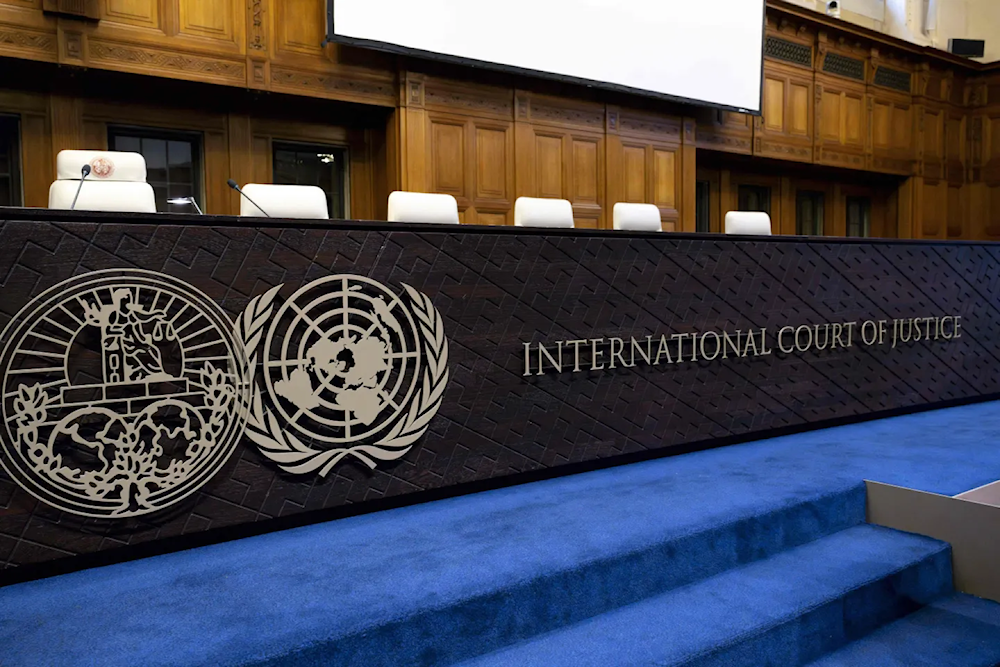ICJ to rule on Gabon–Equatorial Guinea island dispute in oil-rich Gulf
The ICJ is set to rule on a decades-old dispute between Gabon and Equatorial Guinea over three islands in the oil-rich Gulf of Guinea.
-

The bench of the International Court of Justice is seen in this undated photo. (AFP)
The International Court of Justice (ICJ) is set to deliver a ruling on Monday in a decades-long territorial dispute between Gabon and Equatorial Guinea over three small islands located in waters believed to hold significant oil and gas reserves.
At the center of the case are the island of Mbanie, roughly 30 hectares in size, and two smaller, virtually uninhabited islets named Cocotier and Conga. While tiny, the islands lie in a strategically sensitive maritime zone in the Gulf of Guinea, a region rich in hydrocarbons and long plagued by unresolved colonial-era border lines.
The dispute stretches back to 1900, when colonial powers France and Spain signed a treaty in Paris that was intended to define the boundaries of their respective West African territories. But Gabon maintains that a subsequent agreement, the 1974 Bata Convention, clearly establishes its sovereignty over the islands.
"The Bata Convention resolves all sovereignty issues regarding the islands and border delimitation," said Marie-Madeleine Mborantsuo, honorary president of Gabon's constitutional court, during ICJ hearings last October.
Equatorial Guinea, however, alleges that Gabon invaded the islands in 1972 and has occupied them illegally since. The country challenges the very authenticity of the Bata Convention, arguing that Gabon only produced the document in 2003, over three decades after its supposed signing.
REMINDER: The #ICJ will deliver its Judgment on the merits in the case #Gabon / #EquatorialGuinea tomorrow, Monday 19 May 2025 at 3 p.m.
— CIJ_ICJ (@CIJ_ICJ) May 18, 2025
Watch live on UN Web TV here https://t.co/jAixfMnl9m
‘Photocopy of a photocopy’
Equatorial Guinea’s legal team dismissed the validity of the 1974 agreement during the hearings. Philippe Sands, a lawyer for Equatorial Guinea, referred to the submitted text as "scraps of paper".
"You are being asked to rule that a state can rely on a photocopy of a photocopy of a purported document, the original of which cannot be found," said Sands. "No mention was made or any reliance placed [on it] for three decades."
"Moreover, the document presented was not an original but only an unauthenticated photocopy," added Domingo Mba Esono, Equatorial Guinea’s Vice-Minister of Mines and Hydrocarbons.
According to Esono, Equatorial Guinea has been requesting access to an original version of the Bata Convention since 2003, so far without success.
Gabon acknowledges that the original document is missing. Mborantsuo attributed the archival failure to poor preservation, outdated systems, and environmental factors typical of the pre-digital era.
"Archives were badly managed because of a number of things, unfavourable climate, a lack of trained personnel and lack of technology," she said.
ICJ asked to weigh legal texts, not sovereignty
In a rare case of mutual agreement, both states formally requested the ICJ’s arbitration in 2020 to avoid further escalation. However, the Court will not directly assign sovereignty over the islands. Instead, it is being asked to determine which of the two legal documents, the 1900 Paris Treaty or the 1974 Bata Convention, is valid and binding.
“We are convinced the court’s judgment will help our countries resolve their outstanding disputes over sovereignty and borders,” said Esono, “creating a sustainable basis for their relations to flourish.”
The ruling is expected to provide legal clarity and may serve as a stepping stone toward a broader diplomatic settlement in the Gulf of Guinea, a region increasingly shaped by resource competition, regional security concerns, and post-colonial boundary legacies.

 3 Min Read
3 Min Read










